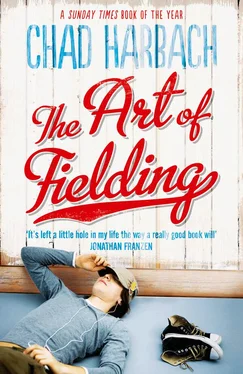“It’s with my full permission that he goes,” he said, looking again at his phone that hadn’t made a peep. “My full permission and understanding. We’ve established parameters for what’s allowable behavior, and I’m quite certain that he abides by those parameters. We communicate openly, like adults. And I know that if I went along, it would change the entire nature of the experience.”
Henry, who understood who he was and not much else, nodded thoughtfully.
“Not that I even want to go along, mind you. I really don’t. I’ve said as much and I meant it. And I appreciate his honesty about what he wants at this stage of life. We’re both young, he says, and I can’t argue with that. But it bothers me nonetheless. For two reasons. Both of them indications of my retrograde sentimentality and general unfitness for modern life, I’m afraid. The first is that his family is there, his parents, his brother, his sister. He ate dinner with them last night. Can you imagine, four other humans who look and act anything like that? I want to meet them, I admit it. I want to meet them quite badly. Which is perhaps embarrassing given that it’s only been seven . . . six weeks since we met. God, six weeks. I’m so pathetic. But I know that if my mom lived within driving distance of here, I’d already have forced the two of them into a room together, just for the sake of my own stupid pleasure. You know?”
Henry nodded again, loaded his plate with pancakes.
“You shouldn’t eat so much flour,” Owen said, taking a single pancake for himself. “Even when I’m stoned I don’t eat much flour. The other reason, of course, is that I’m a staunch monogamist. In practice, if not in theory. I can’t help it. Do I acknowledge the oppressive, regressive nature of sexual exclusivity? Yes. Do I want that exclusivity very badly for myself? Also yes. There’s probably some sort of way in which that’s not a paradox. Maybe I believe in love. Maybe I just badly crave my mother’s approval. Hang on a sec.” Owen jogged back to the hot-food line, spatulaed up four more flapjacks, and slid them onto his plate. “Sorry to babble on like this, Henry. I think I’m immoderately stoned.”
After brunch they went to the union to play Ping-Pong. Owen, even immoderately stoned, proved to be a surprisingly good player. His swings were gentle, but he never missed the table, and Henry, who hated to lose at Ping-Pong, had to hustle and grunt and sweat to stay ahead. All the while Owen spoke steadily about love and Jason and the contradictions of monogamy, paying no discernible attention to the game but still carving out subtle drop shots that sent Henry sprawling across the table. Occasionally Henry would interject a comment, to show that he was listening and interested, but for him monogamy was less a contradiction than a glamorous, possibly unattainable goal, the flip side of his virginity, and he kept his comments vague. Inexperience hadn’t bothered him much in high school — he was only seventeen, after all — but here at Westish, where everyone was so much more sophisticated, not to mention older, it had already come to seem a rare affliction, one that, though not terribly hard to live with, would be both shameful to reveal and hard to remedy.
Still it felt beautiful to move, to play, and soon Henry was down to his T-shirt, leaking sweat. After each game he felt painfully sure that Owen would put down his paddle — he seemed gently bored, Owen did — but Owen, his high forehead dry, still wearing his sweater over his pjs, would merely murmur, “Well done, Henry,” and deliver another cottony serve. They played until it was time for dinner, and afterward they returned to the union to watch the World Series, Henry leaning close to the screen to study the shortstops’ moves, Owen lounging on the couch with an open book. Occasionally, roused by a gloomy thought, Owen would pull out his phone and gaze into its face, then tuck it away again.
Henry slept well that night, tired from four hours of Ping-Pong and somehow calmed by the soft snuffle of Owen’s breathing. On Sunday evening Owen’s phone finally buzzed, and he vanished again.
Even in Owen’s absence, Phumber 405 suggested his whole existence so palpably that Henry, as he sat alone and bewildered on his bed, was often struck by the eerie thought that Owen was present and he himself was not. Owen’s books filled the bookshelves, his bonsai trees and potted herbs lined the windowsills, and his sparse angular music played around the clock on his wireless stereo system. Henry could have changed the music, but he didn’t own any music of his own, so he let it play on. Owen’s expensive rug covered the floor, his abstract paintings the walls, his clothes and towels the closet shelves. There was one painting in particular that Henry liked, and he was glad that Owen had happened to hang it over his bed — it was a large rectangle, smeary and green, with thin white streaks that could easily have marked the foul lines of a baseball diamond. Owen’s pot smoke hung in the air, mingled with the bracing citrus-and-ginger smells of his organic cleaning products, though Henry couldn’t figure out when he smoked or cleaned, since he came home so rarely.
The only traces of Henry’s existence, by contrast, were the tangle of sheets on his unmade bed, a few textbooks, a pair of dirty jeans draped over his chair, and taped-up pictures of his sister and Aparicio Rodriguez. Zero sat on a closet shelf. Get settled, he thought, and Mike will be in touch. He would have liked to clean the bathroom, as a show of goodwill, but he could never find a speck of scum or grime worth cleaning. Sometimes he thought of watering the plants, but the plants seemed to be getting on fine without him, and he’d heard that overwatering could be deadly.
Though his classmates supposedly hailed from “all fifty states, Guam, and twenty-two foreign lands,” as President Affenlight said in his convocation address, they all seemed to Henry to have come from the same close-knit high school, or at least to have attended some crucial orientation session he’d missed. They traveled in large packs, constantly texting the other packs, and when two packs converged there was always a tremendous amount of hugging and kissing on the cheek. No one invited Henry to parties or offered to hit him grounders, so he stayed home and played Tetris on Owen’s computer. Everything else in his life seemed beyond his control, but the Tetris blocks snapped together neatly, and his scores continued to rise. He recorded each day’s achievements in his physics notebook. When he closed his eyes at night the sharp-cornered shapes twisted and fell.
Before he’d arrived, life at Westish had seemed heroic and grand, grave and essential, like Mike Schwartz. It was turning out to be comic and idle, familiar and flawed — more like Henry Skrimshander. During his first days on campus, drifting silently from class to class, he didn’t see Schwartz anywhere. Or, rather, he saw him everywhere. From the corner of his eye he would glimpse a figure that seemed finally, certainly, to be Schwartz. But when he whirled eagerly toward it, it turned out to be some other, insufficiently Schwartz-like person, or a trash can, or nothing at all.
In the southeast corner of the Small Quad, between Phumber Hall and the president’s office, stood a stone figure on a cubic marble base. Pensive and bushy-bearded, he didn’t face the quad, as might be expected of a statue, but rather gazed out toward the lake. He held a book open in his left hand, and with his right he raised a small spyglass toward his eye, as if he’d just spotted something along the horizon. Because he kept his back to the campus, exposing to passersby the moss-filled crack that ran across his back like a lash mark, he struck Henry from the first as a deeply solitary figure, burdened by his own thoughts. In the loneliness of that September, Henry felt a peculiar kinship toward this Melville fellow, who, like everything else on campus that was human or human-sized, he had mistaken several times for Mike Schwartz.
Читать дальше










